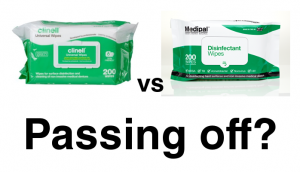Infringement of reputed and registered marks
Infringement of reputed and registered marks – Use on dissimilar goods or services:

The rights of well-known trademarks which are the subject matter of expanded protection under article 6 bis are confined to goods or services similar to goods or services for which it is registered or used.
Protection of trademarks in relation to use on different goods or services has been enacted in Indian law as prescribed in article 16 of WTO-TRIPS in relation to well-known trademarks.
India has introduced rights in relation to different goods of services for all registered trademarks having reputation in India. It is noteworthy that at common law these rights were already available to reputed trademarks even for different goods. Now the similar rights may be asserted in an infringement action.
Section 29(4) – Boon to proprietors of reputed trademarks:

For section 29(4) to have application, the registered trademark should have a reputation in India. It is the reputed marks only which have been extended the right to obtain relief for infringement in relation to use on different goods or services.
The proprietors of reputed marks may debar other similar marks from being used even on different goods or services. Such right is not available to all registered trademarks as they enjoy rights to restrain similar marks in relation to same or similar goods or services only.
Section 29(4) relates to reputed trademarks, which are more often in ownership of nationals of developed countries.
Now under section 29(4), the use of a mark similar to a reputed registered trademark for one set of goods or services on different goods or services would constitute infringement, if any of the events or results mentioned in section 29(4)( c) occur.

The right to restrain the use of trademark on different goods would be available only to such trademarks which have repute in India.
In other words, if the use of offending mark may dilute the registered trademark, the proprietor of registered trademark can take steps preventing the similar offending mark from operating in India.
The court would issue an injunction when prayed for by an owner of the reputed mark in such a case.
It is not precisely known that whether section 29(4)( c ) is inserted to extend larger protection to well-known trademarks as prescribed in article 16 of TRIPS.
For protection, the Indian act has prescribed the principles factor of reputation in India would disallow such marks, which do not have any relationship with Indian market to maintain a futile monopoly of the trademark in India.
The 1999 act under section 11 presents a proposition that there can be well known marks only for the Indian jurisdiction; such marks shall also enjoy expanded protection of section 29(4).
The language of section 29(4) is flexible enough to include both a well-known mark and Indian reputed mark which may not qualify as a well-known mark as per strict standards of section 11(6) to (9), but which has a tangible reputation that can be established before a court. Both must be registered.
Section 29(4) relies on reputation as in passing off:

The commencement of the 1999 act on 15 September, 2003, has made it useful to understand the application of new section 29(4) wherein registered and reputed marks may bring successful infringement action when such a mark is unauthorisedly used on different goods or services.
It is expected that the jurisprudence of the provision in section 29(4) shall rely heavily on the developments in passing off action when trademark is used on different goods or services.
Section 29(4) – corollary to right of well-known trademarks:

The extension of the right of trademark in relation to infringement under section 29(1) from same goods to similar goods or services in section 29(2) was necessary to comply with the obligation of Paris convention and to remain in tandem with other countries.
The further extension of rights in relation to use of mark on different goods or services under section 29(4) addresses the requirements of article 16 of TRIPS and is a corollary to the right to opposition granted to well-known trademarks under section 11(2).

However, a well-known trademark may be such which does not have a reputation in India. In that case the right under section 29(4) shall not be available to it.
- Even though such a well-known trademark on establishing before a court or registrar that it is a well-known trademark as per the yardsticks of section 11(6) to 11(9) and section 2(1)(zg) may be able to exercise the right to oppose, yet the right under section 29(4) is restricted to trademarks having reputation in India.
- A trademark can be a well-known trademark even without registration, but section 29(4) shall not be available to such unregistered well-known trademark.
- The registered trademark referred to in section 29(4) has to establish reputation but not necessarily on any particular goods or services.
- The reputation for any goods or services shall suffice as section 29(4) envisions action in relation to dissimilar goods or services.
- As per the trends of Indian courts it appears that they shall accept reputation in India which is devoid of goods or services or is in vacuum or in other words the courts may accept reputation or knowledge achieved by advertisement and publicity.
Ingredients of section 29(4):
Section 29(4) incorporates the following ingredients:
A person should use, in the course of trade, the mark which is
- Identical with or similar to the registered trademark having reputation in India; and
- Such use is on different goods or services than those covered by registration.
- Such a use of the mark would constitute infringement of the registered trademark having reputation in India,
- If it is found that the use of offending mark produces following two results namely
- Without due cause takes unfair advantage of the distinctive character or reputation of registered trademark.
- Without due cause is detrimental to the distinctive character or repute of the registered trademark.
- In other words, if the offending mark trades on the reputation of the reputed mark or dilutes the reputed registered trademark, the same has been recognized as constituting infringement.

The action is not available to all the registered marks but for invoking section 29(4), minimum two additional things are necessary to be proved – First, besides being registered it must prove reputation in India and secondly, it must either prove that the use of offending mark is either taking unfair advantage or is diluting or tarnishing the reputed and registered mark.
Conditions in section 29(4) are cumulative:
All the clauses in section 29(4) (a) to (c) are to be cumulatively satisfied, only then a case of infringement can be established.
The said clauses are not disjunctive and are to be read cumulatively, and not independently. It is not sufficient for making out a case of infringement under section 29(4), if the case falls under either clause (a) or clause (b) or clause(c).
The conditions specified in all the three clauses have to be satisfied together. This is the obvious from the presence of the word and after each of the three clauses.

The court further said that clause (1) of section 29(4) requires that the mark in question be identical with or similar to the registered trademark. Clause(b) stipulates that the mark in question must be used in relation to goods or services which are not similar to those for which the trademark is registered. But, the infringement, would be constituted when the conditions prescribed in clause(c) are also fulfilled. Section 29(4)(c) requires several conditions to be satisfied. They are:
- The registered trademark must have a reputation in India; and
- The use of the mark in question must be without due cause; and
- Such use must take unfair advantage of or be detrimental to the distinctive character or repute of the registered trademark.
“Solubilis Corporate Services“, the business service provider who is very efficient and provides the best customer support to the clients for all their business related requirements. Trademark registration can be done within the minimal duration of time and at an affordable cost. For more details -> Visit here.